A thank you message from Aberlour…
|
||
|
Dear friends,
I particularly enjoy looking for signs of the changing of the seasons, especially now that Spring is around the corner. Early in the new year, however, I had been concerned by the fact that the bank between the Police Station and the India Gate was covered with brambles and the remains of last year’s growth. How would the daffodils which had given me such delight last spring manage to grow and blossom? To my relief, one morning I came across a volunteer from Dunblane in Bloom strimming the debris and within days the green shoots were emerging from the cleared ground.
I am looking forward to marking Shrove Tuesday with Young Church families at an online Mardi Gras party. Photos of church members or friends making or flipping pancakes would be welcome for next week’s newsletter… With love to you all, (Photos courtesy of Dunblane In Bloom) Today, writes the Ven. Peter M Potter, we begin St Mark’s account of Jesus’ public ministry. He starts by telling us that it is a gospel, that is, good news. So let us begin by listening to David playing the tune of “We have a gospel to proclaim” and you can follow with the words here: We have a gospel to proclaim Tell of His birth at Bethlehem, Tell of His death at Calvary, Tell of that glorious Easter morn: Tell of His reign at God’s right hand, Now we rejoice to name Him King: The readings for today, the fifth Sunday of Epiphany, are Isaiah 40. 21-31, which proclaims God’s power and authority over all creation, and Mark 1.29-39, which portrays Jesus beginning his public ministry with acts of healing. They are read by Jill and Martin. In spite of what you might imagine from television or the cinema, casting out demons is a very rare occurrence. It is also a highly specialised ministry, not to be undertaken lightly. In fact, only once in my ministry have I felt the need to consult a diocesan advisor. His advice was to try to persuade the person to get checked out by a psychiatrist to exclude all other explanations. Unfortunately, I was not able to do so and, from what I hear, the person’s behaviour is unchanged.
So, what has all this to do with us, as we find ourselves in the midst of a pandemic which is having a devastating effect on people’s physical and mental health? We have identified the cause as a virus, not a demon, and people are looking to a vaccine not exorcism for the cure. We could answer that our God-given intelligence has given us the ability to find effective cures for all sorts of illness and we rightly thank him for that. But we can also say that Christians believe there is a distinction between to cure and to heal. The latter is much more wide-ranging. As we have seen, it includes the element of restoration and the breaking down of barriers. One such barrier is the stigma associated with mental illness. I have certainly known a number of people in various congregations who are disturbed or just strange. Obviously in some instances medical help is needed but quite often the informal care and patience they find among church members can create a sense of security and stability for them. At times it is not easy but it can be an opportunity to show that we are willing to go the extra mile. Healing also includes a sense of peace, or shalom to use the Hebrew word. When there is no physical cure, or even when the condition is terminal, there can still be healing. It is a gift of the Holy Spirit, the Comforter, and it comes through prayer and the loving care in words and deeds that dispels fear, isolation and loss. To minister to others in this way is not a highly specialised calling but it does advance God’s kingdom and break down barriers. INTERCESSIONS Let us come to God in our need, and bringing with us the needs of the world. Lord, in your mercy; hear our prayer. We pray for those who do not love themselves, Lord, in your mercy; hear our prayer. For your strength that fills us, your love that heals us, We make these prayers in the power of the Holy Spirit and offer them, together with those of all the saints, to you, Father, through Jesus Christ our Lord. Amen Nerys writes: It has become clear in the last few days that we will be starting our Lenten journey in Lockdown so what about doing something special this year? Ash Wedensday is on 17th February so you have a couple of weeks to look for something that would suit you. There are so many resources available that I thought I’d mention a few possibilities for you to explore. If you enjoy reading, there are many books designed to guide you through the forty days of Lent or to help you focus on a particular theme or issue. This link will take you to a review from the Church Times of over a dozen of this year’s offerings. For those of you who enjoyed our Advent course Simply Wait, Moira Langston suggests The Way of Benedict: Eight Blessings for Lent by Laurentia Johns, a Benedictine nun at Stanbrook Abbey. Others who remember the study we did many years ago of the film Chocolat, might like Still Standing which is based on the Elton John movie Rocketman. If you have Lent books from past years you would like to recommend and/or lend to others, please get in touch so that the information can be included in next week’s newsletter.
The Ignatian Spirituality Centre in Glasgow is offering Knowing Jesus, an opportunity to pray with Scripture, pictures and music on your own or to join in a weekly group meeting on line. Visit www.iscglasgow.co.uk/lent2021.html for more information. The BBC Radio 4 Daily Service will be taking up the themes every week. The Bield Retreat Centre will also offer some material for reflection and companionship on the journey. Information about ‘Lent with the Bield’ can be found on Facebook and on www.bieldatblackruthven.org.uk Finally, this might be an appropriate time to watch the acclaimed TV series ‘The Chosen’ based on the life of Christ. For more information and on opportunity to meet with others to reflect on it, please contact Liz on events @ stmarysdunblane.org Dear friends,
The Vie de Jesus Mafa collection is a response to the Gospel by a Christian community in the Cameroon. In the 1970s, a French Catholic missionary, François Vidil, worked with Mafa Christians to build a resource that would help them teach others about Jesus in a way that connected with their culture and way of life. As the local people acted out scenes from the Gospel set in their own environment, Vidil and his team would sketch and photograph them. These became the basis of a vast collection of paintings depicting almost every story in the four Gospels, made by a team of French artists and returned to the community. You can explore the collection by searching for Mafa Jesus Series Images on the internet. I wonder if there is an image that has been helpful to you during this difficult year? You are welcome to share it with us by sending me a message on rector @ stmarysdunblane.org Nerys ‘Living and dying, striving for holiness and justice, accepting forgiveness and affirmation, living with the questions and the mystery, trusting in the glory and light of resurrection – these are the elements of life and loving that dance and burn in the candles of Candlemas. And these are the candles that are offered to us so that, lit by God’s bright fire, we may be light and warmth for God’s world.’ (Ruth Burgess) This week, Jeanette reflects on the feast that marks the first day of Spring. Many thanks to Morag Hamilton and Rob Smallman for taking part, to Moira Langston and her sister for the music and to David Jamieson for putting the video together. Dear Members of St Mary’s, As someone who grew up on the coast in Wales where it is very unusual to have snow, I get excited when the weather turns wintry. I still miss the fun we had sledging, throwing snowballs and building snowmen when the children were little. I know that I will feel sad when the snow disappears but at this time of year it can also be exciting to see what has been growing under that white carpet. In the church grounds, the snowdrops are starting to appear and other spring flowers are putting up green shoots. Isn’t it amazing how these small plants are able to push their way through the frozen soil. All through the autumn and winter months they have been waiting underground in the dark, their roots reaching out into the soil to fill the bulbs with nutrients to give them the energy to grow the shoots that reach up towards the light. And now that Spring is just round the corner, here they are again, ready to produce their flowers. Many of you are having to wait in your homes until things get better. It’s not always easy, but like the spring flowers, we can make the most of it, allow God’s love to work within us and become a blessing for others.
We know that regular worship and prayer transforms us. In the words of one participant in our Exploring Worship sessions, when we worship and pray regularly, God’s love works away in us shaping us from the inside. I hope that you will manage to continue to meet with God during this second Lockdown. The Ministry Team will be sending out weekly Materials for Worship and also the occasional video with readings, reflections, prayers and songs. The livestreaming of services will resume once public services are allowed once more. In the meantime, here is some information about a number of online activities planned for the weeks ahead, Young Church Candlemas Online Celebration, Tuesday 2nd February at 5 p.m. Young Church Virtual Pancake Party, Tuesday 16th February at 5 p.m. Men’s Group Zoom Meeting, Saturday 13th February at 11 a.m. Contact Martin on mensgroup @ stmarysdunblane.org for more information Ecumenical Lent Groups, ‘Opening the Scriptures: Setting our Hearts on Fire’. For more information and to register interest, contact Anthony on lentgroups @ stmarysdunblane.org Thank you for your prayers for me and my family. You’ll be delighted to hear that my mother and father-in-law both received their first vaccinations on Saturday, the one in Aberystwyth and the other in Aboyne. What a coincidence! I will continue to pray for you and look forward to seeing you back in church. With love, Following the success of the Advent Angels (over a hundred were taken away from the porch of the church), what about knitting some Easter chicks?
For a pattern click here. We are also invited to join other churches in Dunblane to provide knitted crosses for distribution during the weeks before Easter.
For a pattern click here. Blythswood Care which sends Christmas Shoeboxes to Eastern Europe is appealing for knitters to make baby clothes, children’s hats (all ages), small blankets for babies and snoods for next year’s shoeboxes. Please get in touch with Nerys on rector @ stmarysdunblane.org for more information about these projects. The Lord called the disciples to be fishers of men. Our readings today are 1 Corinthians 7.29-31read by Margaret and Mark 1.14-20 read by Les. You are invited to listen to David playing the tune Kelvingrove as you follow the words of John Bell’s hymn ‘The Summons’ or to sing along. Will you come and follow me if I but call your name? Will you leave yourself behind if I but call your name? Will you let the blinded man see if I but call your name? Will you love the “you” you hide if I but call your name? Lord, your summons echoes true when you but call my name. Revd Moira Jamieson writes:
The passages preceding our text today speak of the temptation of Jesus in the desert. Now he has emerged and is ready to proclaim that the Kingdom of God is at hand. He sees the fishermen Simon and Andrew and he calls to them. They immediately drop their nets and follow Jesus, as do James and John who are further down the shoreline. Amazingly none of these four men ask any questions. They don’t enquire about pay, fringe benefits, time off for holidays or even what position they might have in this Kingdom of God – although we know that they eventually got round to that last question! They don’t ask who Jesus is, what he is about, or where he is going. This makes me wonder if they had heard stories of Jesus from others. Had they perhaps witnessed his baptism by John, and had they, maybe, heard him preach some days before he arrived in their fishing village, sensing something ‘different’ about this man? If we look at John 1.41-42, we find that Andrew did in fact know about Jesus as he was a follower of John the Baptist. When he heard John speak about Jesus. he then went and spoke to his brother Simon and told him, “we have found the Messiah.” Whatever the answers are to these questions, Christians today know what it is to be called by God. You or I wouldn’t be members of St. Mary’s today if we didn’t feel that call from God, through the Holy Spirit, to follow Jesus and his teachings. The Holy Spirit stirs up within us the need to be in God’s house, to hear his holy scriptures and to sing praises to him. However, as we have experienced during this Covid pandemic, we don’t need to be in a church building to experience God’s presence with us and to connect with him in worship. Sometimes, the Holy Spirit makes us restless, makes us uncomfortable, and especially at this time of year as we move towards Lent, it makes us look back at our past actions to see if there is anything we need to change. The Holy Spirit can also be reassuring and can bring us peace and calm, soothing our souls in times of trouble. I hope that this has been evident for you during the times of lockdown and all the restrictions we have had to follow. There is a popular belief that to be a disciple of Jesus is to simply follow him. However, the true meaning of the word ‘disciple’ is in fact someone who learns. The twelve disciples of Jesus who were his close companions were always getting the wrong end of the stick and were often accused of not understanding the things that Jesus was trying to teach them, especially in the parables. They were being called to be fishers of people and not fish, and they probably didn’t know just how hard it would be. Many times they would be shunned and persecuted for spreading the good news of the gospel, many times they would struggle to make their voices heard, and many times they would have to rely on the hospitality of strangers to sustain them. In our gospel passage this morning, Jesus said, ‘Follow me, I will make you fish for people.’ Jesus taught Simon Peter and his followers how to ‘fish for people,’ they had to learn a new skill, a new talent, a new ability. If there is one thing that’s true about a good fisherman, it’s that he has to be taught by other skilled fishermen. If we are to be true followers of Jesus, we too must learn what it means to be a fisher of people. What does that mean for us? What are some of the characteristics of becoming good fishers of people? Well, I believe that we must have the right attitude in order to show people that we are living out the gospel in our lives. We need to show people that we are filled with God’s love and that we want to show that love to them and to others. We should try to be encouraging, without being pushy, and we need to be ready to share our faith whenever an opportunity comes along. If people can see that we have God in our lives, we are well on the way to being good fishers of people. We should also take stock of how we are living our lives and be ready to repent if things aren’t This coming season Lent, don’t worry too much about what you can give up, instead let’s all try to be learning disciples, finding time to read our Bibles and learning more about how we too can be good fishers of people. Let us pray Heavenly Father, clothe us with the armour of faith as we trust in you for our every need. Help us to be good stewards of your wonderful creation, always mindful of the impact our lifestyle choices make on the lives of others. As we seek to serve you in our communities, strengthen our faith and give us ears to hear your call to us. Whatever you have given us to do in this world, enable us to do it with firm resolve and joyful obedience, so that our lives and the lives our others are enriched by it. Lord, we are aware of the suffering that is going on in our world just now. The lives of many are on hold until they receive the Covid vaccine. We pray for those who are struggling with mental health issues, those who are fearful for loved ones in hospital and those whose routine hospital appointments are being cancelled and treatments delayed. Give us strength and courage Lord as we face new challenges each day and help us to put our trust in you. Lord in your mercy, hear our prayer. In a world where there is much inequality, help us to count our blessings as we hear of others who are struggling to feed their families and to be generous with what we can do and what we can give to help others. We thank you for food banks and for local charities who are reaching out to families in need, but we pray that world leaders and those in our own governments would do more to promote equality in all areas of life to help eradicate poverty and homelessness. Lord in your mercy hear our prayer. Lord, bless and protect all who are working in healthcare in hospitals and in the community and all essential workers who are in contact with the public each day. Help us to obey the guidelines we are given so that we might help to protect others. We thank you for our times of good health and bring before you now those who are ill at this time either at home or in hospital, and those who are grieving. Lord in your mercy, hear our prayer. We thank you for the church and for our faith during the times of restrictions. Bless our Primus Mark, our Bishop Ian and Nerys, Peter and Jeanette. Lord, bless your Church throughout the world and protect those who are persecuted for their faith. May we all seek to spread the Good News of your Kingdom with those we meet. Lord in your mercy, hear our prayer.
Throughout the Bible, we see God at work, from the opening chapters of the Book of Genesis telling the story of God’s work in Creation to the final chapters of the Book of Revelation. God is particularly active in working with people as today’s Psalm reminds us. ‘You have searched me, LORD, and you know me. You know when I sit and when I rise; you perceive my thoughts from afar. You discern my going out and my lying down; you are familiar with all my ways’ (Psalm 139.1-6, 13-18). God is the Good Shepherd, always guiding and protecting his flock, a gardener, an artist, a potter, a parent, a builder. In today’s Gospel passage, John 1.43-51, read here by Martin, we see God at work through Jesus. In John’s Gospel, Jesus talks several times about being sent to complete his Father’s work. Here the work consists of seeking and finding those who are actively searching for him. We’re often unaware of God at work in our lives and think that it’s all down to us. This is what gives the story of the calling of Phillip and Nathaniel its wry humour. John tells us that Jesus goes to Galilee to find Philip and invite him to be his follower. But listen to Philip’s triumphant words to his friend, Nathanael, ‘We’ve found him about whom Moses and the law and the prophets wrote!’ Philip thinks it is he who has found Jesus, the Messiah, not realizing that it is always God who takes the first step. The longing deep in Philip’s heart, which had led him to study the scriptures – the same longing that had driven Nathanael to sit and pray under the fig tree – was the work of God. As St Augustine said, we could not even have begun to seek for God unless he had already found us. In the New Testament, we see that it is the same deep and sincere desire for relationship with God that had caused Saul to become a Pharisee and such a zealous persecutor of the followers of Jesus. His passion was misplaced, just like Nathanael’s initial incredulity borne out of prejudice, that anything of any value could come from the town of Nazareth. God’s work is transforming work and it doesn’t stop at our initial calling. God works in us for the rest of our lives, guiding us in the right direction, widening our understanding, deepening our compassion, helping us to deal with those things that diminish us and distance us from His love. God also works through us, as he did with Philip, who didn’t argue with his friend but invited him to ‘come and see’. In our Old Testament passage today, 1 Samuel 3.1-20, read here by June, we see God at work through an old, blind priest and a courageous young boy. God who is love has made it his job to know each one of us intimately. He has given me and you a special message to deliver, a special song to sing for others, a special act of love to bestow. No one else can speak my message, or sing my song, or offer my act of love. These are entrusted only to me by a God who knows me personally. ‘Where did you come to know me?’ asks Nathanael as his distain turns to amazement. You’ve seen nothing yet, is Jesus’ response. In responding to God’s unique calling and allowing him to work through us, whatever stage of life we are at, we discover what we were born for and that brings with it a profound sense of rightness and peace. You are invited to follow the words of a hymn by Timothy Dudley-Smith, which speaks of Christ’s work in and through our lives. You may wish to sing along to the tune ‘Love Unknown’ played here by David. Christ is the One who calls, Christ is the One who seeks, Christ is the One who died, Christ is the One who rose Christ is the One who sends, Let us pray to our God who is at work in us and through us, knowing that he is listening to us. (With thanks to John for putting together the intercessions that follow.) To him who alone is God let us make our requests with thanksgiving, through the one mediator, the man Christ Jesus. I ask your prayers for peace in the life of the world, in dangerous places, in disaster areas, in more stable areas and in all our dreams. I ask your prayers for all who suffer injury, sickness and loss. I ask your prayers for all who wield authority and influence, through God’s call. I ask your prayers for all whom we have wronged and all whom we disagree with. I ask your prayers for our bishops as they field questions about our churches being closed and for all whom Christ has appointed to his service, as they nurture our faith. O God, whose will it is that all should find salvation and come to know the truth: receive This week, instead of the usual written Materials for Worship based on the morning Service of the Word, a video version of what would have been tonight’s reflection on the Epiphany is offered. Many thanks to Ruth Burgess who planned and intended to lead the service with Nerys, to Alastair Christmas, Peter Holmes and Davie for taking part and to David Jamieson for putting the video together. Dear friends, Today we celebrate the Feast of the Epiphany, marking the coming of the Wise Men to the Christ-child following the star. You may wish to take some time today to read the Gospel passage from the second chapter of Matthew and to join with many Christians across the world in the ritual of chalking your front door and praying a blessing on your home and all those who will enter it during the year ahead. Here is a sheet you can download containing more information and a prayer. You will have heard, no doubt, that churches are now closed for public worship and private prayer until the end of January. Our all-age Epiphany Celebration at 4 p.m. today has moved on-line. If you wish to join the nine families with children who intend to attend on Zoom at 4 p.m., please email Liz Owen on events@stmarysdunblane.org for the link. This Sunday, our ‘Poems and Prayers for Epiphany’, a reflective introduction to the new season, will be sent to you as a video and as written Materials for Worship. During the weeks ahead, I will be celebrating the eucharist in the church every Sunday at 10.30 a.m. You are invited to join me at home in prayer and worship using the materials which will be sent out to you. The Provincial Eucharist will be broadcast at 11 a.m. every Sunday. A link can be found at www.scotland.anglican.org/broadcast-sunday-worship/ With the help of the Ministry Team, I am also hoping to put together videos of reflective services for Candlemas and Ash Wednesday. In order to keep us in touch with each other, the congregational newsletter will resume next week. Feel free to send contributions to me at rector @ stmarysdunblane.org. Please don’t hesitate to phone me on 824225 if you are in need of support or prayer during this difficult time. I am never too busy for a chat! If I’m not able to answer, please leave a message and I’ll get back to you as soon as I can. I intend to be at the Rectory every day except Mondays.
During Advent, I discovered the art of Virginia Wieringa and have enjoyed meditating on her series of Advent banners, many of which were commissioned by churches in the States. She explains on her website Virginia Wieringa Fine Art that her work often reflects the mysteries she perceives in the world and that the Advent series was inspired by words by the German poet, Rainer Maria Rilke: Have patience with everything unresolved in your heart and try to love the questions themselves… Don’t search for answers now, because you would not be able to live them. And the point is to live everything. Live the questions now. Perhaps then, someday far in the future, you will gradually, without even noticing it, live your way into the answer. Like the Wise Men, we as individuals and as a church are on an uncertain journey depending on God’s guidance. I invite you to join me in praying the Collect for today for ourselves, our country and our world: Eternal God, who by a star led wise men to the worship of your Son, guide by your light the nations of the earth, that the whole world may know your glory; through Jesus Christ our Lord, who lives and reigns with you and the Holy Spirit, one God, now and for ever. Amen. with love to you all, The Ven. Peter Potter has prepared a reflection and prayers for the second Sunday of the season of Christmas. A happy and blessed New Year to you all. I’m sure we’re all hoping it will be better than the last one. Even though many people will have removed their tree and decorations, we are still in the Christmas season until Wednesday, the arrival of the Magi on the Feast of the Epiphany. We don’t often get two Sundays in the in-between days from Christmas to Epiphany and it’s even more unusual to have a reading from the book called Ecclesiasticus, which was written in the period between the Old and New Testaments. Today’s reading, Ecclesiasticus 1.1-12, is significant though, as it features the figure of Wisdom (Sophia), who is also found in Proverbs and has much in common with John’s concept of the Word in today’s Gospel, John 1:1-18 Listen to the passage from Ecclesiasticus read by Mary Birch. The Gospel passage is read by Anthony Birch. The Gospel according to St John is a masterpiece in its own right. It is written in simple, direct language – “In the beginning was the Word. And the Word was with God, and the Word was God.” What could be more simple? But what depths lie beneath. Like a Russian doll, as you lift off one layer, you find another. Especially here, in this wonderful Prologue, these simple words introduce a mystery. But it is a mystery that reveals, not covers up, its meaning. “In the beginning…” Yes, all four Gospels begin at the beginning. But they all begin at a different place. For John, the beginning is not in Bethlehem, with shepherds and angels; no donkey, no manger, not even Mary. Echoing the first verse of the Book of Genesis, “In the beginning” means just that. For John, the story of Jesus is the story of the whole cosmos. But yet, as we shall see shortly, it is also the story of particular events at a particular time. And yet again, a story that continues down to our own time, and beyond. Such is the artistry of the Fourth Gospel.
John is able to develop this insight, referring next to light, the first item on God’s list for the creation of the cosmos, a light that is not solely a physical phenomenon but also moral and spiritual, that is to say, truly life-giving. The Word spoken to create light brings with it the gift of life, for without it, creation is merely lifeless matter. This light, enlightening and life-giving, manifests itself at many times and in many places, in particular in the person of John the Baptist whose rôle is to prepare people to receive the true light, which had already been shining but had gone unrecognised. Like the opening of some film epic which begins with a broad panorama and then gradually zooms in on a particular character, John is now ready for the climax of his prologue. “The Word became flesh and dwelt among us.” He identifies the Word with Jesus Christ and the whole history and future of the cosmos is now centred on one person. This is the whole Nativity Story condensed into one simple sentence but a sentence so profound that we can no longer read Luke’s and Matthew’s accounts as pretty stories about an important person. Nor – crucially – can we view the earthly life of Jesus, his crucifixion and resurrection, as God’s afterthought or Plan B, which is what some of today’s popular explanations seem to imply. John has carefully prepared us for this verse, which reveals the eternal purpose of God and the whole meaning of the universe. This verse actually uses the Russian-doll technique, for it conveys further levels of interpretation. The word that we translate as “dwelt” or “lived” (or perhaps “stayed”, in the Scottish sense of the word, would be an even better translation) is in Greek “pitched his tent” or, more literally “set up his tabernacle”. Pitching a tent has overtones of mobility, not being tied to a particular place. It reminds us of how God travelled with the Israelites up to the time when King Solomon built the temple and it also hints at the earthly life of one who would “have nowhere to lay his head”. To the Old Testament prophets, “tabernacle” was the place where God would dwell in the midst of his people for ever. Wherever we are, whatever is happening, God stays with us. All this and more is contained in these 18 short verses. The mystery of God’s will and purpose in bringing the cosmos into being has been made known in the Word, now revealed in the incarnate Son of God. In his time, John the Baptist testified to him and now it is our turn to speak the words, to do the deeds, so that the Word that has become flesh is made known in our time and place. Prayers for the New Year Lord Jesus, you are the one who stands at the gate of the year. Give us a light that we may tread safely into the unknown. As we go into this new year, we place our hand into yours, for that is better than any earthly light and safer than a known way! Lord, hear us. Lord, graciously hear us. Lord, you make all things new . In these dark days we pray for all who suffer – through illness, uncertainty, family breakups, war, starvation. Bring hope alive in their hearts and cause their spirits to be born again. In this new year kindle in the hearts of all a mighty flame so that in our time, many will see your wonders and live to praise your name. Lord, hear us. Lord, graciously hear us. Lord Jesus, come and ‘first-foot ’for us. May we welcome you into our home and we invite your blessing, for us, for our families and neighbours. May your love be a light to guide us through this new year. Lord, hear us. Lord, graciously hear us. Almighty and eternal God, we pray for your Church, for Christian people throughout the world, especially this congregation. Draw our hearts to you, guide our minds, fill our imaginations, control our wills, so that we may be wholly yours, dedicated and committed to you; and then use us, we pray, as you desire, and always to your glory and the wellbeing of your people. Lord, hear us. Lord, graciously hear us. Lord, accept these prayers through our Saviour Jesus Christ, the Word made flesh. Amen. The Ven. Peter Potter has prepared a reflection and prayers for the first Sunday of the season of Christmas which is also the last Sunday of the year. Here we are almost at the end of the year, looking forward to a new – and hopefully better – one in a few days, a situation neatly personified in the scene described in today’s reading, Luke 2.22-40. It is a meeting that one of the people present had long been waiting and longing for. You are invited to listen to Ruth Burgess reading the first part of the passage and then to follow the words of a hymn based on Simeon’s prayer as David Sawyer plays the tune before listening to the rest of the reading. Faithful vigil ended, All the Spirit promised, This your great deliverance Here we have two old people, Simeon and Anna, almost at the end of their lives, and a baby at the threshold of his life. And Mary, full of joy and pride at having given birth, but also full of anxiety and uncertainty about the responsibilities of caring for this tiny child. She too is on the threshold – from girl to mother. No doubt Joseph shares some of these feelings, for his previously settled life (as we suppose) has been turned upside down by this birth.
“Mankind has come of age” wrote Dietrich Bonhoeffer in a telling phrase. The cross is a powerful symbol of what humanity does to its heavenly Father in the process of growing up. The experience of Mary at the foot of the cross, her soul pierced by a sword, is an experience shared by many a parent. It is also God’s experience as he contemplates the children he has created and loved growing up and coming of age. As children are growing up, a parent’s rôle (whether it is an earthly or a heavenly parent) changes to standing behind our children as a support, not in front as a screen. Mary at the foot of the cross is our example here. Being there is what matters. Or the father of the Prodigal Son. The loving thing was not to stop the son going away but to be there when he came back. But in the meantime it hurts, because love hurts. This scene in the Temple is a story about transitions, crossing a threshold: from baby to child; from the carefree life of a teenager to the cares and responsibilities of a wife and mother; from one generation as it hands over to the next. Growing up, coming of age is not just about being independent and doing your own thing. It means becoming responsible, taking on commitments, giving back in return for the love we have received from our parents, the Church and God, the pain-bearer and the rock at our back. Prayers of Intercession Father, when your Son was born, there was no room at the inn. Mary, in the pain of labour, Father, her Son and yours, came as a light shining in the darkness. In the Temple, Simeon sang, a song for peace. When she saw the holy Child, Anna praised you and began to speak about him. Father, your Son shared an earthly home in Nazareth, In that holy birth, heaven is come down to earth, Father, whose Son our Saviour As Christians the world over celebrate Christ’s birth. You may wish to finish your time of worship by reading or singing along to ‘What Child is this?’ as David plays the tune. What Child is this who laid to rest Why lies he in such mean estate, So bring Him incense, gold and myrrh, St Mary’s Young Church have made a Christmas Nativity video – click below to view it on our YouTube channel: |
||
|
Copyright © 2024 St Mary's Scottish Episcopal Church - Scottish Charity no. SC016932
|
 Many of you are aware that almost every morning and evening for the last eleven months, I have walked from our home in Argyle Way to the church and back again, a distance of about a mile each way. This routine not only keeps me physically fit but also gives me the time and space I need to keep me well mentally and spiritually. I find that it is helpful as I walk to focus on whatever I can see and hear around me, from the spectacular views of the hills at the start of my journey to the call of the robin welcoming me at my destination .
Many of you are aware that almost every morning and evening for the last eleven months, I have walked from our home in Argyle Way to the church and back again, a distance of about a mile each way. This routine not only keeps me physically fit but also gives me the time and space I need to keep me well mentally and spiritually. I find that it is helpful as I walk to focus on whatever I can see and hear around me, from the spectacular views of the hills at the start of my journey to the call of the robin welcoming me at my destination . We are approaching a new season in the Church Year, a time perhaps to seek to clear away those things in our lives that are getting in the way of God’s love. Lent in Lockdown is an opportunity to turn inwards, to deal with any old hurts and fears and the feelings of grief, guilt, unworthiness or anger that accompany them. It’s the perfect time to make more space to allow Hope, Love and Joy to grow in our hearts and minds. We may not be able to meet together to receive a cross of ash on our foreheads this year, but we can take some time on Ash Wednesday to reflect on the meaning of that symbolic action and commit ourselves to allowing God to work in us this Lent, transforming us from the inside out. Readings and prayers will be sent to you next week to help you make the most of this opportunity.
We are approaching a new season in the Church Year, a time perhaps to seek to clear away those things in our lives that are getting in the way of God’s love. Lent in Lockdown is an opportunity to turn inwards, to deal with any old hurts and fears and the feelings of grief, guilt, unworthiness or anger that accompany them. It’s the perfect time to make more space to allow Hope, Love and Joy to grow in our hearts and minds. We may not be able to meet together to receive a cross of ash on our foreheads this year, but we can take some time on Ash Wednesday to reflect on the meaning of that symbolic action and commit ourselves to allowing God to work in us this Lent, transforming us from the inside out. Readings and prayers will be sent to you next week to help you make the most of this opportunity. In today’s reading we also hear an account of a physical healing. Jesus heals Peter’s mother-in-law, who had had a fever. The wording here is the same as a description of an exorcism. What is interesting though is that, after she had been healed, she got up “and served them”. Presumably she fed them a meal, like any good Jewish mother. In other words, she is restored to her rightful place in the family, just as later in the Gospel lepers, the disabled, those possessed (mentally ill?) And various sinners are restored to the community. Jesus’ mission is to break down the barriers created by Satan, whether through illness or sin.
In today’s reading we also hear an account of a physical healing. Jesus heals Peter’s mother-in-law, who had had a fever. The wording here is the same as a description of an exorcism. What is interesting though is that, after she had been healed, she got up “and served them”. Presumably she fed them a meal, like any good Jewish mother. In other words, she is restored to her rightful place in the family, just as later in the Gospel lepers, the disabled, those possessed (mentally ill?) And various sinners are restored to the community. Jesus’ mission is to break down the barriers created by Satan, whether through illness or sin.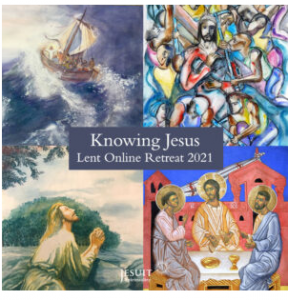 There are also accompanied online retreats run by various organisations.
There are also accompanied online retreats run by various organisations.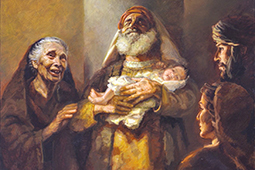 Jeanette and I have been overwhelmed this week by the response we’ve had to the video reflection for Candlemas which was shared with you and on the St Mary’s website and Facebook page. A number of you were in touch on Sunday to say how helpful you had found it and how much you had enjoyed the choice of songs and images. And then on Monday morning, out of the blue, I received a phone call from Lorna, a retired headteacher and Church of Scotland member in Edinburgh, who had stumbled upon the video by accident while searching for another St Mary’s church. She had been so blessed by the prayers and reflections that she just had to get in touch! She must have sent a link to Joyce Watson, the Episcopal priest on Iona and a friend of mine, because yesterday and email arrived with a request from Joyce for a copy of one of the images we had used. She loved how we had chosen portrayals of the scene in the Temple from different cultures but it was the contemporary Dutch picture by Jan van tHoff with the faces of Simeon and Anna lit by the light of Christ which had touched her. ‘A lovely picture to share, and probably to keep for myself as reminder of how precious old age is’, she wrote.
Jeanette and I have been overwhelmed this week by the response we’ve had to the video reflection for Candlemas which was shared with you and on the St Mary’s website and Facebook page. A number of you were in touch on Sunday to say how helpful you had found it and how much you had enjoyed the choice of songs and images. And then on Monday morning, out of the blue, I received a phone call from Lorna, a retired headteacher and Church of Scotland member in Edinburgh, who had stumbled upon the video by accident while searching for another St Mary’s church. She had been so blessed by the prayers and reflections that she just had to get in touch! She must have sent a link to Joyce Watson, the Episcopal priest on Iona and a friend of mine, because yesterday and email arrived with a request from Joyce for a copy of one of the images we had used. She loved how we had chosen portrayals of the scene in the Temple from different cultures but it was the contemporary Dutch picture by Jan van tHoff with the faces of Simeon and Anna lit by the light of Christ which had touched her. ‘A lovely picture to share, and probably to keep for myself as reminder of how precious old age is’, she wrote. Today came another request for a copy of another picture. Peter Lee who had lived and worked in Africa in his youth wanted to know more about the image which depicts the characters in Luke’s story as African people. I had to admit to him that I had failed to find the name of the artist but promised to look again. I decided to investigate the term ‘Jesus Mafa’ which accompanied one copy of the image and found that Mafa is the name of an ethnic group in Northern Cameroon and surrounding countries. Further research led me to a series of more than 70 paintings and a fascinating story …
Today came another request for a copy of another picture. Peter Lee who had lived and worked in Africa in his youth wanted to know more about the image which depicts the characters in Luke’s story as African people. I had to admit to him that I had failed to find the name of the artist but promised to look again. I decided to investigate the term ‘Jesus Mafa’ which accompanied one copy of the image and found that Mafa is the name of an ethnic group in Northern Cameroon and surrounding countries. Further research led me to a series of more than 70 paintings and a fascinating story …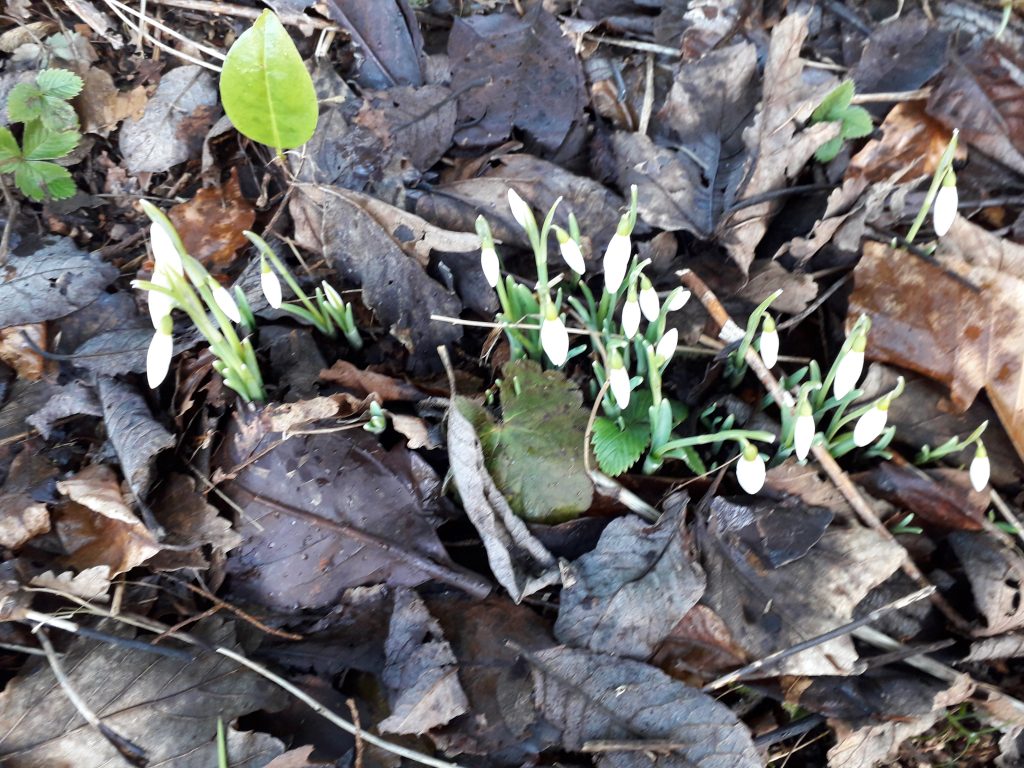
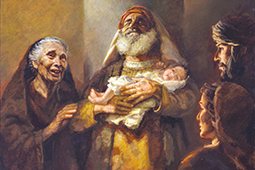 Next Tuesday, 2nd February is Candlemas, an ancient festival marking the first day of Spring. It was a day when people brought the candles they would be using in their homes for the year to the church to be blessed. The story we read from the Bible on that day tells of Mary and Joseph taking the child Jesus to Jerusalem. In the temple that day were two elderly people who had been waiting all their lives for God to send a special person to bring the light of love into the world. Simeon recognised Jesus in the crowd and started praising God whilst Anna danced with joy. How did they know that this ordinary little baby with his ordinary mum and dad was the one promised by God? Luke’s Gospel doesn’t tell us but we know that every day for many, many years, these two had come to the temple to worship God and to pray.
Next Tuesday, 2nd February is Candlemas, an ancient festival marking the first day of Spring. It was a day when people brought the candles they would be using in their homes for the year to the church to be blessed. The story we read from the Bible on that day tells of Mary and Joseph taking the child Jesus to Jerusalem. In the temple that day were two elderly people who had been waiting all their lives for God to send a special person to bring the light of love into the world. Simeon recognised Jesus in the crowd and started praising God whilst Anna danced with joy. How did they know that this ordinary little baby with his ordinary mum and dad was the one promised by God? Luke’s Gospel doesn’t tell us but we know that every day for many, many years, these two had come to the temple to worship God and to pray.
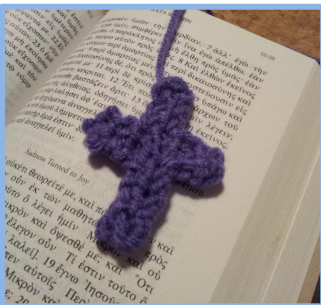
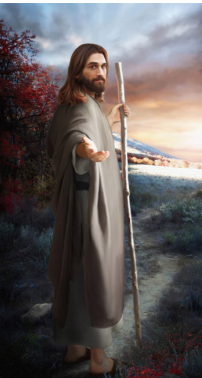 Whenever I sing the words of this hymn, it reminds me of my commitment to be a follower of Christ at my confirmation many, many years ago. It also reminds me of the promises I made at my ordination in 2008. The call to discipleship is what our Gospel passage this morning, reminds us of. When Jesus called his first disciples, he wasn’t just inviting them to come and follow him, but to learn from and be taught by him. The story is basically a fishing story. It’s a fishing story about Simon Peter and his brother Andrew. Simon Peter, as you know, was a fisherman by trade. He fished on the Sea of Galilee, a beautiful big lake, thirteen miles long and eight miles wide. A lake which Sandy and I sailed on three years ago after eating some Tilapia fish (or Peter’s fish). The men who fished on the lake weren’t fishing as sport, they were fishing for their livelihoods.
Whenever I sing the words of this hymn, it reminds me of my commitment to be a follower of Christ at my confirmation many, many years ago. It also reminds me of the promises I made at my ordination in 2008. The call to discipleship is what our Gospel passage this morning, reminds us of. When Jesus called his first disciples, he wasn’t just inviting them to come and follow him, but to learn from and be taught by him. The story is basically a fishing story. It’s a fishing story about Simon Peter and his brother Andrew. Simon Peter, as you know, was a fisherman by trade. He fished on the Sea of Galilee, a beautiful big lake, thirteen miles long and eight miles wide. A lake which Sandy and I sailed on three years ago after eating some Tilapia fish (or Peter’s fish). The men who fished on the lake weren’t fishing as sport, they were fishing for their livelihoods.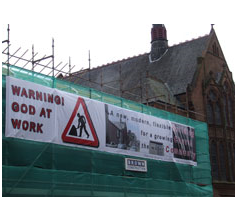 Recently Nerys came across this photo of a sign outside a Dundee church. It is intended to bring a smile to the faces of passers by but it also expresses a truth which, in these difficult times, is both comforting and challenging.
Recently Nerys came across this photo of a sign outside a Dundee church. It is intended to bring a smile to the faces of passers by but it also expresses a truth which, in these difficult times, is both comforting and challenging. 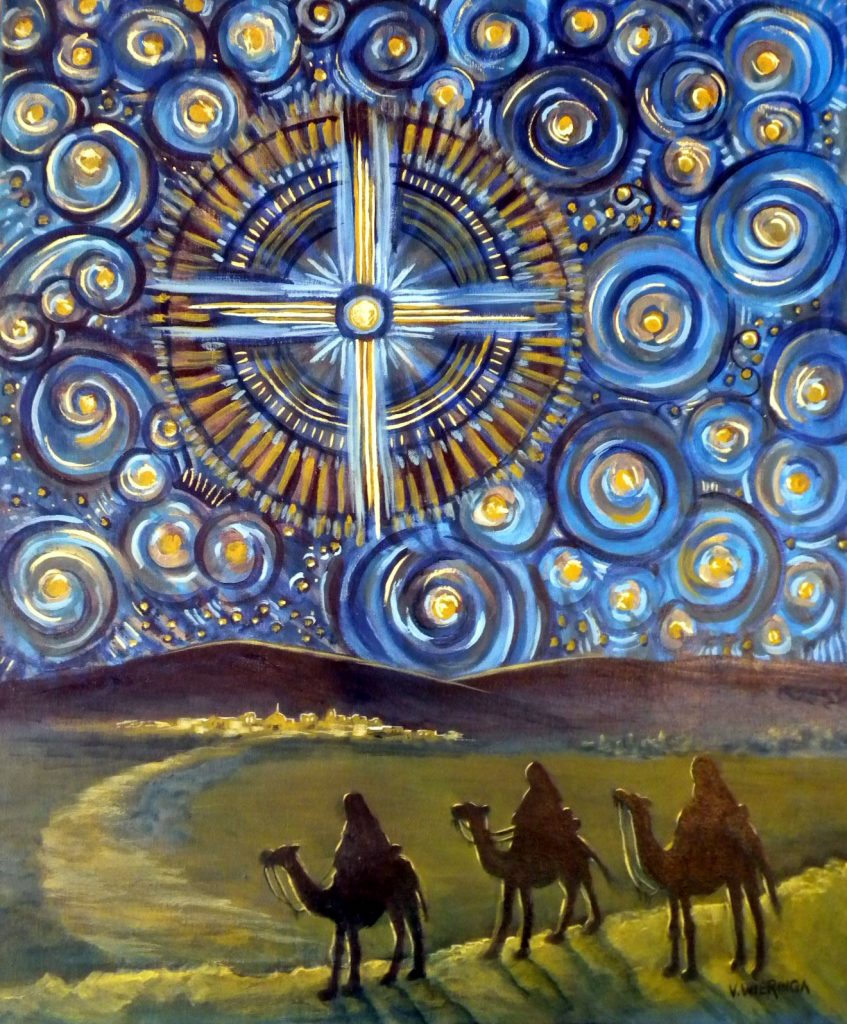
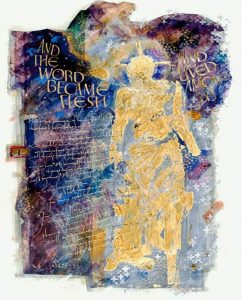 Unlike the shepherds and angels, the Word is not something you could put a costume on for the Nativity Play. But it is there in the Bible; in Ps 33, we find “By the word of the Lord, the heavens were made”. It was also found in contemporary Greek philosophers, so the term Logos, Word would also be familiar to educated Gentiles. The Word, then, is God’s creative, dynamic force: “God said ‘Let there be light. And there was light’”. But this Logos is no ordinary word. When we speak, we make words with our lips and throat muscles, whereas this Word was with God. It was part of God’s being from all eternity. In Greek, the tense used is past continuous, that is, the Word was, always has been and still is part of the divine being and activity.
Unlike the shepherds and angels, the Word is not something you could put a costume on for the Nativity Play. But it is there in the Bible; in Ps 33, we find “By the word of the Lord, the heavens were made”. It was also found in contemporary Greek philosophers, so the term Logos, Word would also be familiar to educated Gentiles. The Word, then, is God’s creative, dynamic force: “God said ‘Let there be light. And there was light’”. But this Logos is no ordinary word. When we speak, we make words with our lips and throat muscles, whereas this Word was with God. It was part of God’s being from all eternity. In Greek, the tense used is past continuous, that is, the Word was, always has been and still is part of the divine being and activity. 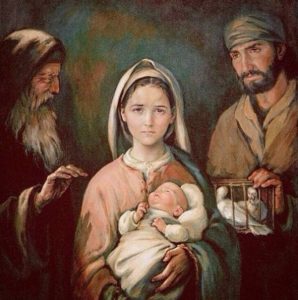 It is a turning point for them all – and for us too, as a disturbing light enters the familiar, almost cloyingly comfortable, Nativity story. Simeon’s words must have discomforted Mary: “A sword will pierce your own soul”. It is what every parent has to face as they realise their child will grow up and grow away from them. Growing up, making your own way in the world, is not easy and it is hard for parents as they watch their child do so. But somehow the whole thing is necessary. Jesus could not stay a baby for ever. It would have been a pretty story but, if he had, he could not have saved us. Our children cannot stay dependent for ever, wrapped up in cotton wool.
It is a turning point for them all – and for us too, as a disturbing light enters the familiar, almost cloyingly comfortable, Nativity story. Simeon’s words must have discomforted Mary: “A sword will pierce your own soul”. It is what every parent has to face as they realise their child will grow up and grow away from them. Growing up, making your own way in the world, is not easy and it is hard for parents as they watch their child do so. But somehow the whole thing is necessary. Jesus could not stay a baby for ever. It would have been a pretty story but, if he had, he could not have saved us. Our children cannot stay dependent for ever, wrapped up in cotton wool.